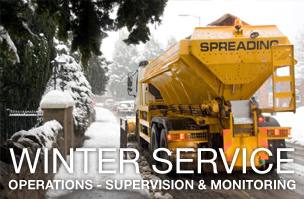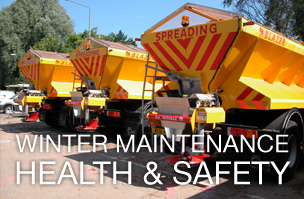Code of Practice Recommendations
Extract from the Code of Practice for Highway Maintenance Management
Training and Development
- Ensuring adequately trained and experienced staff is key to successful delivery of Winter Service.
- To ensure appropriate level of competence, training and development needs of all personnel should be established and reviewed annually, including health and safety and appropriate vocational qualifications. Training should then be provided where appropriate before the Winter Service season.
Drivers and Operators
- Those operating spreading equipment are well served with vocational qualifications such as the City & Guild‟s 6159 modules. It is essential that any operative involved in the use or operation of any plant or machinery has received relevant formal training to do so. Where reserve drivers are available as part of an authority's contingency plans it is essential that they are trained to an equal standard of competence.
Winter Supervisors
- Under City & Guilds 6159, there is a specific module for winter maintenance supervisors which ensures that the first tier of management is aware of their duties and sufficiently competent to fulfil them. It is essential that appropriate staff within an authority‟s organisation undergo this training.
Winter Decision Maker and Manager
- Currently there is no formal winter decision maker or winter manager qualification, however most authorities follow a similar approach. Road weather forecasting and systems training (such as for Road Weather Information Systems) are commonly used indicators of a decision maker‟s competence, combined with proven experience. However, the appropriate experience required to deliver the service can only be gained „on the job‟ over a number of years. Good practice suggests that novice decision makers should undergo an internal training programme. This should include briefings on the Winter Service Plan, meteorological training, experience of operational delivery and mentoring by more experienced staff. This should continue until their experience and competence is proven. It is essential that such training should be well documented to ensure that competence can be demonstrated. Weather forecast providers are able to provide training on meteorology and providers of weather sensors often provide training on how the weather affects the road surface. Exercises delivered via independent organisations can provide decision makers with experience of the management of severe conditions.
Senior Management and other Key Stakeholders
- Authorities may benefit in providing basic training to senior management and certain key stakeholders in delivery of Winter Service. This can be valuable in managing the expectations in delivering the service during both normal and severe winter conditions. A short training programme will provide a basic understanding of the Winter Service, its limitations and pressures. This may be delivered efficiently as an electronic package or briefing note to minimise staff time in the delivery of it to the multitude of stakeholders.
Winter Service Training Courses
- Winter Service - Unit 680 (Health and Safety)
- Winter Maintenance 6159 - Training
- Winter Maintenance 6159 - Assessments
- Winter Maintenance - Unit 621 (Manager/Supervisor)









